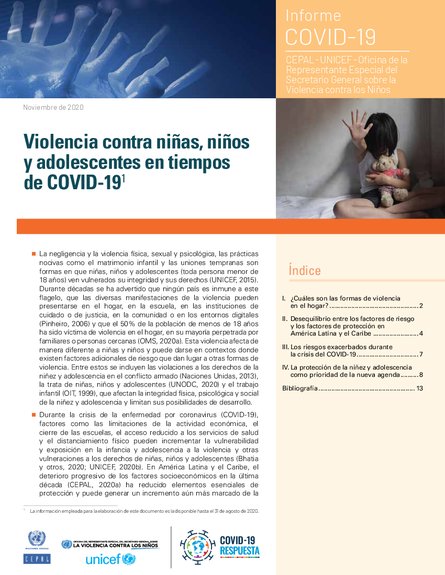
The document, prepared jointly by ECLAC, UNICEF and the Office of the Special Representative of the Secretary General on Violence against Children, recommends concrete actions to address violence against children and adolescents within the framework of the response to the COVID crisis -19.
In times of COVID-19, girls, boys and adolescents in Latin America and the Caribbean have been and are exposed to a greater risk of being victims of domestic violence, while at the same time they have less protective factors, warns a document published by the Economic Commission for Latin America and the Caribbean (ECLAC), the United Nations Children's Fund (UNICEF) and the Office of the Special Representative of the Secretary General on Violence against Children.
The document Violence against children and adolescents in times of COVID-19 warns that recent estimates estimate a prevalence of 55 percent of physical aggression and 48 percent of psychological aggression in parenting in Latin America and the Caribbean.
It also adds that, within the framework of containing the pandemic, protective factors have been reduced and the risks of violence have been exacerbated. On the one hand, there is a lower capacity to detect incidents of violence due to physical isolation and the closure of face-to-face activities in educational institutions and early childhood centers, the reduction in the social offer of the States and the economic crisis that has impacted the level of household income.
Added to the above is the limited coverage of internet access and the generation gap in knowledge about the digital environment in adults, which limits the work of adequate monitoring and accompaniment of girls and boys who today spend more time online.
Likewise, the report warns that the risk factors for girls, boys and adolescents to be victims of domestic violence have been exacerbated. Among these, the increase in reports of violence against women (which has a close relationship with violence perpetrated against girls, boys and adolescents), the increase in stress and anxiety, the economic impact on children and adolescents stand out. the increase in online activity of both girls, boys and adolescents, as well as perpetrators of sexual violence.
To address violence against children and adolescents in the framework of the response to the COVID-19 crisis, the document proposes additional recommendations to the policies, programs and actions that existed before the crisis:
Put children at the center of policies and plans for the economic recovery of countries to reverse the increase in poverty and eradicate historical inequities that perpetuate structural challenges such as gender-based violence and violence against children and adolescents At the same time, trust in democratic institutions is rebuilt.
Optimize resources through the convergence of services that, among others, allow for coordinated attention to cases of violence against women and against girls, boys and adolescents; to expand the number of recipients of the public offer of services; that provides specific and differential attention to populations that were already in vulnerability, and that promotes the economy of care, attending to the balance in the distribution of roles and tasks.
Provide universal and free mental health care and psychosocial support to prevent and treat mental health disorders such as depression, anxiety, suicidal tendencies and stress in parents and caregivers, and in children and adolescents themselves, and their instead promote assertive parenting and communication practices at home.
Ensure universal access to the internet for all children and adolescents in uncovered areas, as well as the dissemination of electronic devices to girls, boys and adolescents to ensure their continuing education.
Protect children against online violence, spreading messages about safe and responsible behavior online and adopting concrete measures to adequately combat violence online.
Guarantee universal social protection for families including cash incentives, universal health coverage, and recognizing the protection of childhood, mental health and education as essential services and part of an intersectoral response based on rights.
Assign a sustained investment in children and strengthen services for the well-being and protection of children against all forms of violence.
Promote labor policies aimed at supporting positive and gender-based parenting. Involve girls, boys and adolescents in the construction of solutions and opportunities at the community, local, regional and national levels.